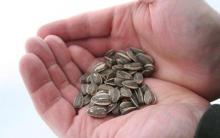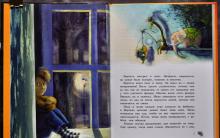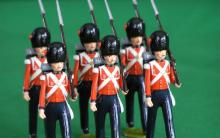Grinev in the Belogorsk fortress.
The main character of the story is Peter Grinev. He appears before us as a young man from a poor noble family. His father, Andrei Petrovich Grinev, was a simple military man. Even before his birth, Grinev was enrolled in the regiment. Peter was educated at home. At first he was taught by Savelich, a faithful servant. Later, a Frenchman was specially hired for him. But instead of gaining knowledge, Peter chased pigeons. According to established tradition, noble children had to serve. So Grinev’s father sent him to serve, but not in the elite Semenovsky regiment, as Peter thought, but in Orenburg, so that his son would experience real life, so that he would become a soldier, and not a shamaton.
But fate threw Petrusha not just to Orenburg, but to the distant Belogorsk fortress, which was an old village with wooden houses, surrounded by a log fence. The only weapon was an old cannon, and it was filled with rubbish. The entire team of the fortress consisted of disabled people. Such a fortress made a depressing impression on Grinev. Peter was very upset...
But gradually life in the fortress becomes bearable. Peter becomes close to the family of Captain Mironov, the commandant of the fortress. He is accepted there as a son and taken care of. Soon Peter falls in love with Maria Mironova, the daughter of the commandant of the fortress. His first love turned out to be mutual, and everything seemed fine. But then it turns out that Shvabrin, an officer exiled to the fortress for a duel, had already wooed Masha, but Maria refused him, and Shvabrin takes revenge by denigrating the girl’s name. Grinev stands up for the honor of his beloved girl and challenges Shvabrin to a duel, where he is wounded. After recovery, Peter asks his parents for his parents’ blessing for his marriage to Mary, but his father, angry at the news of the duel, refuses him, reproaching him for this and saying that Peter is still young and stupid. Masha, passionately loving Peter, does not agree to marriage without the blessing of her parents. Grinev is very upset and upset. Maria tries to avoid him. He no longer visits the commandant's family, life becomes more and more unbearable for him.
But at this time the Belogorsk fortress is in danger. The Pugachev army approaches the walls of the fortress and quickly captures it. All residents immediately recognize Pugachev as their emperor, except for commandant Mironov and Ivan Ignatich. They were hanged for disobedience to the “one and true emperor.” It was Grinev’s turn; he was immediately led to the gallows. Peter walked forward, looked death in the face boldly and courageously, preparing to die. But then Savelich threw himself at Pugachev’s feet and stood up for the boyar’s child. Emelyan ordered Grinev to be brought to him and ordered him to kiss his hand, recognizing his power. But Peter did not break his word and remained faithful to Empress Catherine II. Pugachev got angry, but remembering the hare sheepskin coat given to him, he generously released Grinev. Soon they met again. Grinev was traveling from Orenburg to save Masha from Shvabrin when the Cossacks caught him and took him to Pugachev’s “palace”. Having learned about their love and that Shvabrin was forcing a poor orphan to marry him, Emelyan decided to go to the fortress with Grinev to help the orphan. When Pugachev found out that the orphan was the commandant’s daughter, he got angry, but then he released Masha and Grinev, keeping his word: “To execute like this, to execute like this, to favor like that: that’s my custom.”
The Belogorsk fortress greatly influenced Peter. From an inexperienced youth, Grinev turns into a young man capable of protecting his love, maintaining loyalty and honor, and able to judge people sensibly. \
The role of the Belgorod fortress in the life of Grinev.
Many consider “The Captain's Daughter” to be a story, an ordinary story about life, love, and the Pugachev uprising. In my opinion, this is not entirely accurate. If life history were introduced into the school curriculum, The Captain's Daughter would be the most accurate textbook. In this story, the little boy Petrusha turns into the adult and courageous Pyotr Grinev. He came to the Belogorsk fortress as a “mama’s boy”, dreamed of a beautiful life in St. Petersburg, he was not worried about his own future. However, he leaves her as a determined, brave man.
Of course, this transformation was influenced by many factors, one of which was his love for Masha Mironova. He did not immediately fall in love with this girl, since Peter’s new acquaintance, Shvabrin, presented Masha as an extreme fool. But later Grinev realized that Shvabrin’s actions were controlled by unrequited love for Masha. It seems to me that Peter immediately liked Maria, but he believed Shvabrin so much that he was afraid to admit it even to himself.
There were many obstacles on the way of Masha and Peter. Shvabrin, who once seemed a very interesting and nice person, dramatically changed Grinev’s attitude towards himself. He continued to disgrace Masha, Grinev could not stand it. The duel with Shvabrin shows how strong his feeling for Masha was. But Grinev’s parents did not understand this. The father was categorically against his son's wedding.
The unexpected attack of the Pugachevites changed Grinev’s entire fate. If he had not been in the Belogorsk fortress, he would never have known true loyalty to his homeland, his beloved girl, would not have experienced the trials of life, would not have fully understood who Pugachev really was. Acquaintance with Pugachev unexpectedly played a big role in Pugachev’s pardoning of Grinev. If earlier Pugachev seemed to Peter as an impostor who only cared about power, now he turned out to be an ordinary person who has his own weaknesses and is quite kind. And when Grinev came to ask him for help, he did not refuse, despite Peter’s slightly impudent response to Pugachev’s request not to fight against him.
Shvabrin turned out to be not only a traitor to his country, but also a shameless hypocrite who took advantage of Grinev’s departure to Orenburg. But for this he was punished by Pugachev, who learned from Peter that Shvabrin wanted to forcefully marry Masha.
Compared to Grinev, Shvabrin seems like a person devoid of all the qualities that Peter was endowed with. He was not familiar with such concepts as duty, honor, dignity. He did not respect the rights of women, and one might even say that he did not know how to love.
The story about Grinev’s life in the Belogorsk fortress occupied a very large place in his notes. After all, it was in the Belogorsk fortress that Grinev learned to truly love, respect his country, and persevere through obstacles. And this is what made him a real man.
Life of Grinev in the Belogorsk fortress. The story “The Captain's Daughter” is written in the form of memoirs of the main character, Pyotr Grinev. Petrusha’s childhood was free and easy; he “lived as a small child, chasing pigeons and playing leapfrog with the yard boys.” But upon reaching the age of sixteen, the father decides
send Peter to serve in the army. Petrusha was happy about this, because he hoped to serve in St. Petersburg, in the guard, and was sure that life there would be as easy and carefree as in his home. The father rightly judged that Petersburg can only teach a young man to “wind and hang around,” so he sends his son to the general with a letter in which he asks his old friend to assign Peter to serve in a safe place and to be stricter with him.
Thus, Pyotr Grinev, upset by the far from encouraging prospects for his future, ends up in the Belogorsk fortress. At first, he expected to see a “dead fortress” on the border of the Kyrgyz-Kaisak steppes: with formidable bastions, towers and ramparts. Peter imagined Captain Mironov as “a strict, angry old man who knew nothing but his service.” Imagine Peter’s amazement when he approached the real Belogorsk fortress - “a village surrounded by a log fence”! Of all the formidable weapons, there is only an old cast-iron cannon, which serves not so much for the defense of the fortress, but for children’s games. The commandant turns out to be an affectionate, kind old man of “tall stature”; he goes out to conduct exercises dressed at home - “in a cap and a Chinese robe.” No less a surprise for Peter was the sight of the brave army - the defenders of the fortress: “about twenty old disabled people with long braids and triangular hats,” most of whom could not remember where the right was and where the left was.
Very little time passed, and Grinev was already glad that fate had brought him to this “God-saved” village. “The commandant and his family turned out to be sweet, simple, kind and honest people, to whom Peter became attached with all his soul and became a frequent and long-awaited guest in this house.
In the fortress “there were no reviews, no exercises, no guards,” and yet, the young man, not burdened with service, was promoted to officer.
Communication with pleasant and sweet people, literary studies, and especially the love that awoke in Peter’s heart for Masha Mironova played an important role in shaping the character of the young officer. With readiness and determination, Pyotr Grinev stands up to defend his feelings and Masha’s good name in front of the vile and dishonest Shvabrin. Shvabrin's dishonest blow in the duel brought Grinev not only a serious wound, but also the attention and care of Masha. Peter's successful recovery brings the young people together, and Grinev proposes to the girl, having previously confessed his love. However, Masha’s pride and nobility do not allow her to marry Peter without the consent and blessing of his parents. Unfortunately, Grinev’s father believes that this love is just a whim of a young man, and does not give his consent to the marriage.
The arrival of Pugachev with his “gang of bandits and rebels” destroyed the lives of the inhabitants of the Belogorsk fortress. During this period, the best traits and moral qualities of Pyotr Grinev are revealed. He sacredly fulfills his father’s behest: “Take care of your honor from a young age.” He boldly refuses to swear allegiance to Pugachev even after the commandant and many other defenders of the Belogorsk fortress were killed before his eyes. With his kind-heartedness, honesty, directness and decency, Peter managed to earn the respect and favor of Pugachev himself.
Peter’s heart does not hurt for himself during his participation in hostilities. He worries about the fate of his beloved, who was first left an orphan and then captured by the defector Shvabrin. Grinev feels that, having once confessed his feelings to Masha, he took responsibility for the future of a lonely and defenseless girl.
Thus, we see how important the period he spent in the Belogorsk fortress played in the life of Pyotr Grinev. During this time, the hero managed to grow and mature, he thought about the meaning and value of human life, and in communication with various people, all the wealth of the hero’s moral purity was revealed.
Grinev in the Belogorsk fortress
The main character of the story is Peter Grinev. He appears before us as a young man from a poor noble family. His father, Andrei Petrovich Grinev, was a simple military man. Even before his birth, Grinev was enrolled in the regiment. Peter was educated at home. At first he was taught by Savelich, a faithful servant. Later, a Frenchman was specially hired for him. But instead of gaining knowledge, Peter chased pigeons. According to established tradition, noble children had to serve. So Grinev’s father sent him to serve, but not in the elite Semenovsky regiment, as Peter thought, but in Orenburg, so that his son would experience real life, so that he would become a soldier, and not a shamaton.
But fate threw Petrusha not just to Orenburg, but to the distant Belogorsk fortress, which was an old village with wooden houses, surrounded by a log fence. The only weapon was an old cannon, and it was filled with rubbish. The entire team of the fortress consisted of disabled people. Such a fortress made a depressing impression on Grinev. Peter was very upset...
But gradually life in the fortress becomes bearable. Peter becomes close to the family of Captain Mironov, the commandant of the fortress. He is accepted there as a son and taken care of. Soon Peter falls in love with Maria Mironova, the daughter of the commandant of the fortress. His first love turned out to be mutual, and everything seemed fine. But then it turns out that Shvabrin, an officer exiled to the fortress for a duel, had already wooed Masha, but Maria refused him, and Shvabrin takes revenge by denigrating the girl’s name. Grinev stands up for the honor of his beloved girl and challenges Shvabrin to a duel, where he is wounded. After recovery, Peter asks his parents for his parents’ blessing for his marriage to Mary, but his father, angry at the news of the duel, refuses him, reproaching him for this and saying that Peter is still young and stupid. Masha, passionately loving Peter, does not agree to marriage without the blessing of her parents. Grinev is very upset and upset. Maria tries to avoid him. He no longer visits the commandant's family, life becomes more and more unbearable for him.
But at this time the Belogorsk fortress is in danger. The Pugachev army approaches the walls of the fortress and quickly captures it. All residents immediately recognize Pugachev as their emperor, except for commandant Mironov and Ivan Ignatich. They were hanged for disobedience to the “one and true emperor.” It was Grinev’s turn; he was immediately led to the gallows. Peter walked forward, looked death in the face boldly and courageously, preparing to die. But then Savelich threw himself at Pugachev’s feet and stood up for the boyar’s child. Emelyan ordered Grinev to be brought to him and ordered him to kiss his hand, recognizing his power. But Peter did not break his word and remained faithful to Empress Catherine II. Pugachev got angry, but remembering the hare sheepskin coat given to him, he generously released Grinev. Soon they met again. Grinev was traveling from Orenburg to save Masha from Shvabrin when the Cossacks caught him and took him to Pugachev’s “palace”. Having learned about their love and that Shvabrin was forcing a poor orphan to marry him, Emelyan decided to go to the fortress with Grinev to help the orphan. When Pugachev found out that the orphan was the commandant’s daughter, he got angry, but then he released Masha and Grinev, keeping his word: “To execute like this, to execute like this, to favor like that: that’s my custom.”
The Belogorsk fortress greatly influenced Peter. From an inexperienced youth, Grinev turns into a young man capable of protecting his love, maintaining loyalty and honor, and able to judge people sensibly.
One of the works of the school curriculum, written by the Russian writer Alexander Sergeevich Pushkin, is “The Captain's Daughter”. In this article we will analyze the meaning of the place in which the young man Petrusha grew spiritually and turned into the man Peter Grinev. This is the Belogorsk fortress. What role does it play in the overall design of the work? Let's figure it out.
How was the work created?
Before moving on to the question of what plot and semantic functions the Belogorsk fortress and all the episodes that took place in it perform, it is necessary to turn directly to the history of the creation of the story. No analysis of a work of art can do without analyzing the events that served as the impetus for the creation of this or that creation, without searching for real prototypes of the heroes.
The origins of the novel go back to the middle of 1832, when Alexander Sergeevich first addressed the topic of the uprising of Emelyan Pugachev of 1773-1775. First, the writer gains access to secret materials with the permission of the authorities, then, in 1833, he goes to Kazan, where he looks for contemporaries of those events who have already become old people. As a result, the collected materials formed the “History of the Pugachesky Revolt,” which was published in 1834, but did not satisfy Pushkin’s artistic research.
The idea of a major work directly, with a renegade hero in the title role, who ended up in the Pugachev camp, had been brewing in the author since 1832, during the time of work on the no less famous novel “Dubrovsky”. At the same time, Alexander Sergeevich had to be extremely careful, because censorship could consider such a work “freethinking” due to any little thing.
Grinev prototypes
The essential components of the story changed several times: for some time, Alexander Sergeevich was looking for a suitable surname for the key character, until he finally settled on Grinev. By the way, such a person was actually listed in real documents. During the uprising, he was suspected of conspiring with the “villains,” but as a result he was released from arrest due to the lack of proof of his guilt. However, the prototype of the main character was another person: initially it was intended to take the second lieutenant of the 2nd Grenadier Regiment, Mikhail Shvanovich, but later Alexander Sergeevich chose another participant in the events described, Basharin, who was taken prisoner by the rebels, but escaped, and eventually began to fight on side of the pacifiers of the rioters.
Instead of the planned one nobleman, two of them appeared on the pages of the book: the antagonist Shvabrin, a “vile villain,” was added to Grinev. This was done to circumvent censorship barriers

What is the genre?
The work, in which the Belogorsk fortress will play a significant role, was interpreted by the author himself as a historical novel. However, today most literary researchers, due to the small volume of a literary work, classify it as a story genre.
Belogorsk fortress: what did it look like?
The fortress appears in the story after the main character, Petrusha Grinev, reaches the age of 16. The father decides to send his son to serve in the army, which the young man thinks about with joy: he assumes that he will be sent to St. Petersburg, where he can continue to lead a wild, cheerful life. However, things turn out a little differently. Where does young Grinev end up? In the Belogorsk fortress, which, however, turned out to be even worse than its young man imagined.
Located in the Orenburg province, it was, in fact, a village surrounded by a wooden log palisade! Here Captain Mironov, the managing commandant, who, in Petrusha’s opinion, should have been a firm, stern, strict old man, turned out to be affectionate and soft, met the young man in a simple way, like a son, and conducted military exercises in a “cap and a Chinese suit.” robe." The brave army consisted entirely of old invalids who could not remember where the right was and where the left was, and the only defensive weapon in the fortress was an old cast-iron cannon, from which it is unknown when the last time they fired.

Life in the Belogorsk fortress: how Peter’s attitude changes
Over time, however, Grinev changed his opinion about the Belogorsk fortress: here he studied literature, he was surrounded by kind, bright and wise people with whom he loved to talk - this especially applied to the Mironov family, that is, to the commandant himself, his wife and daughter Masha. Peter’s feelings flared up for the latter, which is why the young man stood up to defend the girl’s honor and his attitude towards her in front of the vile, envious, jealous Shvabrin.
A duel took place between the men, as a result of which Grinev was unfairly wounded, but this only brought him even closer to Masha. Despite the lack of blessing from Father Peter, the lovers continued to remain faithful to each other in words and deeds.

After the conquest of the fortress by Emelyan Pugachev and his bandit gang, the idyll collapses. At the same time, Peter continues to remember and honor the best moments of his life spent here and does not betray this place even after it falls into the hands of the rebels. He flatly refuses to swear allegiance to Pugachev, and even the fear of death does not frighten him. The main character is ready to follow the commandant and other killed defenders of the fortress. However, the leader of the uprising agrees to spare Grinev for his integrity, honesty, and loyalty to honor.
Grinev will end up in the Belogorsk fortress, the essay about which is presented in detail in this article, even after the events described, because he will return here in order to save his beloved Masha, captured by the defector Shvabrin. As you can see, the fortress is one of the central places in the work. A large number of important episodes, from the point of view of plot and development of action, take place here.
Meaning
The essay “Belogorsk Fortress” cannot end without describing the significance of this place in the semantic structure of the story. Fortress is one of the most important components in the development of a hero’s personality. It is here that Grinev meets with serious love, here he faces the enemy. As a result, it is within the walls of the fortress that Peter turns from a boy into a mature man, a man capable of taking responsibility for his actions.

Here he thinks about many truly philosophical matters, for example, about the meaning of life, about honor, about the value of human life. Here his morality and purity are finally crystallized.
Obviously, it was simply impossible to think of a better place - Pushkin’s genius showed that appearance is not as important as life itself, way of life, traditions, and culture of a certain place. The Belogorsk fortress is an element that accumulates everything truly Russian, folk, and national.











Consequences of tubal ligation during caesarean section
The benefits of sunflower seeds for the heart, hair and nerves
Why do my legs give way at the knees?
Name energy: how the patronymic influences fate and the birth program Name patronymic meaning character
First Chinese Emperor